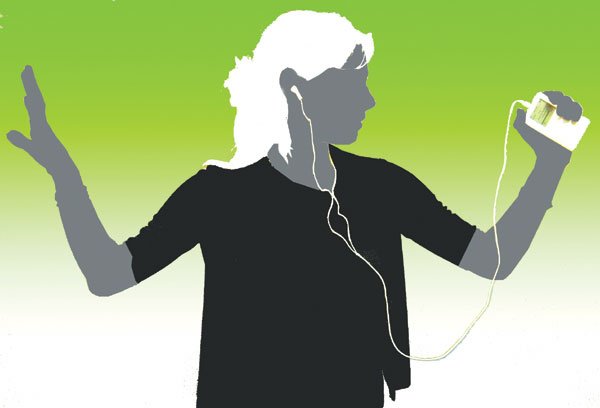The late 1990s brought more than
”
The Sopranos
”
into pop culture’s lexicon. They also brought forth pioneering
peer-to-peer file service Napster, a software program that allowed
home computer users to trade files such as music and video with
other users for free.
The late 1990s brought more than “The Sopranos” into pop culture’s lexicon. They also brought forth pioneering peer-to-peer file service Napster, a software program that allowed home computer users to trade files such as music and video with other users for free.
The free-for-fall didn’t last, though. When the Supreme Court handed down a ruling last week naming file-sharing services liable for copyright infringement, the pronouncement fell on a vastly different industry landscape from the one just five years ago.
After a campaign of lawsuits against Napster and individuals downloading music from such services, record companies and corporate entities are now increasingly the purveyors of online music, offering the comfort of legal sanction and even a receipt for paying for and downloading individual music tracks.
Today, with the threat of lawsuits and lost privileges, downloading from sites such as Kazaa and BitTorrent is not only illegal, it’s passé, according to local college students, who fall into peer-to-peer networks’ biggest user segments.
Still, the rise of these sites as a source of limitless, personal and free music has left an indelible mark on the music industry by changing the way companies package, produce and sell music.
The advent of peer-to-peer networks was more than a giant scam, according to 20-year-old Gilroy resident Tomas Carrillo, a member of the Warped Tour-signed band Five Minutes to Freedom.
“I usually buy music after I listen to it online, so I have mixed feelings about downloading,” said Carrillo. “It can hurt the artist, and the artist can lose money, but it also means that a lot more people get to experience their music, too. It’s not monitored, so that may be destructive, but it also creates a lot of opportunity.”
For small artists who may never receive million-dollar contracts, it’s a welcome entry into the broader musical scene, exposing larger number of possible fans to their recordings. And a new breed of artists, capable of disseminating their work separate from giant record companies, can bring home a greater portion of the profits generated from file-sharing buzz than their multiplatinum peers.
The Backstreet Boys, for instance, rose to fame as one of the best-selling acts of the 1990s, but they never received royalties from the millions of CDs they sold, according to press reports from band management, which claimed the band was stifled under a mound of debts stemming from its costly concerts and heavy promotional costs.
But the Recording Industry Association of America, having suffered heavy losses with its slow reaction to the threat of peer-to-peer sharing, cried foul and has filed hundreds of lawsuits against heavy users. To date, they’ve settled more than 600 cases for an average sum of $3,000 each, according to The Associated Press.
The recording-industry association hasn’t revealed just how much it has lost to such networks, but it claimed sales dropped 31 percent between 2000 and the beginning of 2004. The reasons for this drop, and even the exact numbers, are up for debate, as other sources such as Forrester Research place the loss around 15 percent. By comparison, the Canadian Recording Industry reported sales drops of 20 percent between 2000 and 2003, with estimated losses topping $250 million.
Still, peer-to-peer services have seemed unstoppable. Though the number of music files for trade on the Internet has dropped precipitously – down from 1.1 billion to 700 million between June 2003 and June 2004 – the services that trade them have not died out yet, according to the International Federation of the Phonographic Industry, and some artists see these sites as having merit.
Artists such as the band Heart and rapper-activist Chuck D. have supported file-sharing as a platform for greater access to their work, and even Artists House Records President John Snyder, a 32-time Grammy nominee, argued for the merits of file sharing in an article he co-wrote for Salon.com. He cited the success of rapper Eminem, whose sophomore album, “The Eminem Show,” purportedly was the most downloaded album of all time. It went on to become the world’s best-selling album of 2002.
Though the future of file-sharing remains unclear, record companies currently are experimenting with a mix of peer-to-peer and pay-to-play services, offering streaming music, free tracks, subscription purchases and whole albums in digital formats.
On May 5, the EMI Group, the world’s third-largest music company, inked a deal with the technology firm Snocap to create a legal peer-to-peer, music-share network. The world’s first- and second-largest music companies, Universal Music Group and Sony BMG Bertelsmann, reportedly also have contracts with the company, run by Napster founder Shawn Fanning.
Snocap’s protective technology works on the premise that each song can be traced by a digital stamp, sort of like a fingerprint. The music can be disseminated on a peer network, but after a certain number of full-length plays – three in most cases – a voice-over appears on the track asking customers to purchase a legitimate copy of the song.
The technology would be a major step in reconciling the interests of record executives hungry for CD sales and consumers eager to listen before they buy, but the increasingly corporate feel of the Web has turned some users away.
“I used to do some downloading from MP3.com, which was legal, but I quit because it really started to suck,” said Ben Corona, a 19-year-old Gavilan sophomore from Gilroy. “It got bought by CNET (a technology rating service). Before, a lot of local bands could add their stuff, but now I can’t find as much independent music.”
Corona has gone back to buying his music in a new old-fashioned way. Instead of paying top dollar at music retailers, he buys heavy metal and hard core CDs online from eBay. Most of the discs aren’t scratched, he said, and many come wrapped in their original shrink-wrap.
What buyers like Corona may not realize is that resale of the CDs, especially those at very low cost, is not always spurred by the seller’s desire for personal profit. At www.downhillbattle.org, a Web site of the Peer-to-Peer Legal Defense Fund, supporters are encouraged to sell on eBay their CDs that are approved by the Recording Industry Association of America to benefit downloaders being sued by the association.
“By selling these CDs on eBay or Amazon, we can turn the record industry’s own products into a tool to fight the lawsuits,” the site states. “Sell all those jewel cases, liner notes and plastic discs. Then, donate the funds to someone who’s been sued.”
Peer-to-peer services first came under fire in 2000, when Metallica drummer Lars Ulrich sued Napster for copyright infringement over the Internet distribution of an unreleased song the band was producing for the “Mission Impossible 2” soundtrack. In statements before the Senate Judiciary Committee in July of that year, he also lashed out at users of the network.
“It’s like each of them won one of those contests where you get turned loose in a store for five minutes and get to keep everything you can load into your shopping cart,” Ulrich told the committee. “With Napster, though, there’s no time limit and everyone’s a winner – except the artist. Every song by every artist is available for download at no cost and, of course, with no payment to the artist, the songwriter or the copyright holder.”













